| The Institute and the Pharmaceutical Industry | |||||
| Sex hormones control sexuality-an assumption of sexual endocrinological research at the time shared by the staff of the Institute. Sexual impotence and frigidity were believed to be treatable through hormone preparations. The first to report on testing the impotence remedy "Juvenin" on patients at the Institute was Arthur Kronfeld, in 1922. In his findings, he supported medicinal treatment to accompany psychotherapy. Starting in the mid-1920s, impotence remedies were developed at the Institute. The first was "Testifortan" 1 2 , developed by Hirschfeld and Schapiro, followed by "Titus Pearl", 3 5 by Hirschfeld. The two medications were almost identical mixtures of well-known aphrodisiacs with a "detectable" hormone content. These potency preparations were intended as a substitute for psychotherapy in treating psychosomatic impotence, since therapy was considered too expensive and long-term. In their contract with the Hamburg phamaceutical company Promonta, which manufactured Testifortan, Hirschfeld and Schapiro secured a share of the income from sales 4 . After the Nazis came to power in 1933, advertising for the medication no longer mentioned Hirschfeld's name, and in 1935, Hirschfeld's share of the income from Titus Pearls was taken to pay a tax debt the Nazis had invented. The medication continued to be produced according to the original procedure in West Germany until 1988.
|
|||||
| X | ||
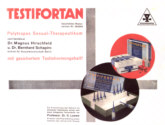 | ||
| 1 | ||
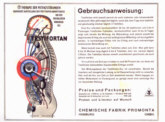 | ||
| 2 | ||
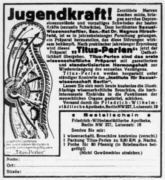 | ||
| 3 | ||
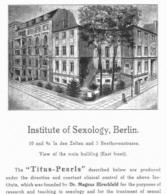 | ||
| 4 | ||
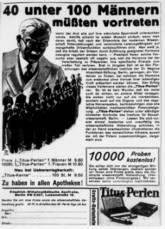 | ||
| 5 | ||
 | ||